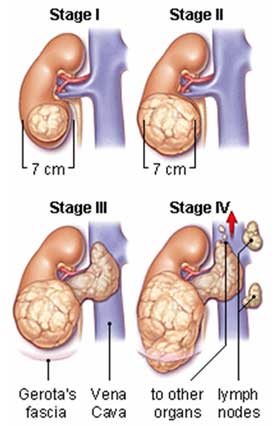Hope for the treatment of kidney cancer
Kidney cancer usually has no symptoms until it has spread to other organs. This type of cancer is most difficult to treat. New chemical treatments promise to prolong survival in later stages, but are also very toxic.
Scientists at Davis UC Cancer Center have discovered a number of ways to prevent the self-healing mechanism of cancer genes and thus help chemical treatments for kidney cancer to be effective and less vulnerable. more harmful.
Robert Weiss, professor of urology at UC Davis and at Sacramento Sacramento Medical Center, said: 'Cancer cells are known for their ability to make copies of themselves quickly. The latest drugs only slow down the process and not completely cure the disease and there are many side effects. We want to find ways to maximize the effectiveness of chemotherapy with the lowest possible dose. '
 Kidney cancer. (Photo: ohsu.edu) New therapies aim to disrupt the stability of cancer cells at the DNA level, reducing their ability to self-replicate. Understanding that the p21 gene plays an important role in the recovery of cancer cell DNA , and being able to disrupt the beneficial effects of cures, Weiss sought to identify possible interfering compounds. into this process.
Kidney cancer. (Photo: ohsu.edu) New therapies aim to disrupt the stability of cancer cells at the DNA level, reducing their ability to self-replicate. Understanding that the p21 gene plays an important role in the recovery of cancer cell DNA , and being able to disrupt the beneficial effects of cures, Weiss sought to identify possible interfering compounds. into this process.
The team tested thousands of compounds and 12 of them were found to be able to combine recombinant proteins p21.Later experiments showed that three of the 12 compounds reduced the ability of p21 to work, preventing kidney cancer cells' ability to repair themselves, making them more responsive to treatments.
Weiss said: 'These results are very encouraging, especially when the treatment of kidney cancer is still difficult. Our research provides hope that in the future p21 gene inhibitors may be used in conjunction with conventional cancer treatments to prolong the life of kidney cancer patients.
For future studies, Weiss will focus on the three types of compounds mentioned above to determine the lowest possible concentration, which is still effective and promotes anti-cancer properties. He will test these three types of compounds with standard treatment in animal models, then finally experiment on humans.
He said: 'The goal is to find new ways to treat cancer and bring these methods into the health system as quickly as possible'.
The results of the study are published in the journal Cancer Biology and Therapy. Other co-authors at UC Davis include See-Hyoung Park, Xiaobing Wang, Riuwu Liu and Kit Lam. The research was funded by the National Cancer Institute, the American Veterans Association, the Morris Animal Foundation, the National Institutes of Health and the National Science Foundation.
- Detection of enzymes for effective treatment of kidney cancer
- New hope for kidney failure
- Detection of genes that cause kidney cancer in children
- New drugs treat kidney and stomach cancer
- Things to know about cutaneous kidney stones
- New therapy for cancer treatment
- 3 warning signs of inflammatory kidney disease, not to develop into kidney failure you are new
- Nucleotic synthesis has hope in treating cancer
- New measures to treat kidney cancer
- The black woman turns white after taking cancer medicine
- New hope for the treatment of blood cancer
- What if people live with only one kidney until the end of their lives?
 Why do potatoes have eyes?
Why do potatoes have eyes? 'Tragedy' the world's largest carnivorous life: Death becomes ... public toilet
'Tragedy' the world's largest carnivorous life: Death becomes ... public toilet Tomatoes were once considered 'poisonous' for 200 years
Tomatoes were once considered 'poisonous' for 200 years Detecting microscopic parasites on human face
Detecting microscopic parasites on human face